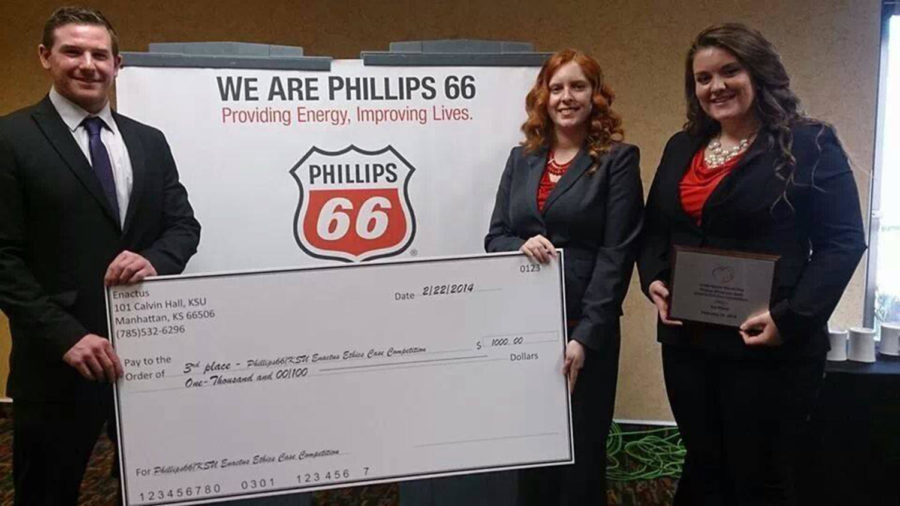ISU Enactus team takes third in ethics case competition
Carrie Belanger, senior in marketing, Jessica Graham, junior in management, and Sean Seymour, senior in marketing, hold their $1,000 prize from the K-State/Phillips 66 Ethics Case Competition. The team had 36 hours to develop a solution to an ethical case involving the use of social media in screening current and potential employees.
March 7, 2014
Three members of the ISU Enactus team braved snow and hail and drove to Manhattan, Kan. for the Phillips 66-Enactus Business Ethics Case Competition. The team took home third place and a $1000 prize.
Enactus is an international organization that uses a business approach to help people in need.
Scott Elston, senior lecturer of management and the club’s faculty adviser, said that it is a self-motivated group that engages in “socially responsible, community-conscious activities.”
Teams from five Midwest states were faced with an ethical dilemma and given 36 hours to prepare a four-page executive summary and 19-minute presentation of their response for a panel of professional leaders.
Carrie Belanger, senior in marketing and club president; Sean Seymour, senior in marketing and vice president of projects; and Jessica Graham, junior in management and vice president of administration, were in attendance.
“I had heard about ethics in class,” Graham said, “but I had never had that hands-on experience.”
The dilemma, written by a faculty member at Kansas State University, dealt with an employer requesting the username and password of a social media site from an applicant.
Teams decided on the ethics of the situation and whether or not companies should have social media policies for current and prospective employees.
The students framed their response on a utilitarian approach to ethics, which is to act in a way that produces the most good with the least amount of harm.
The team delegated tasks to explore the situation and worked together on their response.
“Our opinions changed as we researched,” Belanger said.
Belanger said that Graham had the most tedious task of reviewing every state’s legislation and found that only five states — Maine, Florida, Montana, New Mexico and Kansas — did not have laws in place or being discussed to protect social media users against privacy violations.
The team explored Manhattan during the 36-hour time frame and then worked for 14 hours, only leaving the hotel for food and supplies.
“If we would have just stayed in the hotel room for the whole entire time, we would have gone crazy,” Graham said.
They deemed the employer’s conduct unethical because social media user agreement forms explicitly state that users should not give out passwords.
Social media is still utilized by employers “whether or not the candidate knows it,” Graham said.
Elston said that students should be careful about what they put on the “powder keg” of social media because posts can be taken out of context or seen by a larger audience than intended.
“The whole idea that privacy exists between employees and employers is a dangerous assumption,” Elston said.
Belanger said that she does not recommend connecting with employers, coworkers, customers or clients on personal sites, but rather building up professional networks on sites such as LinkedIn.
“[My LinkedIn] is like four pages long,” Belanger said, “because I want them to have so much information there that they don’t have to look anywhere else.”
This was the first time that any of the team members competed in an ethics competition, Seymour said.
Half of the prize money — $500 — was used for travel expenses and contest fees. Each member will receive a $100 reimbursement and the remaining $200 will supply marketing materials for Enactus’ Kenya Basket Project.
In this project, started by the Western Kentucky University Enactus chapter, members sell baskets made by women in Kenyan tribes to help them maintain a sustainable income, Belanger said.
Baskets will be sold at this weekend’s Relay for Life, during Veishea and in local stores.
“We worked really hard for everything we got, and it seems no matter how hard you work, you can’t get too much further ahead,” Belanger said. “Being able to help somebody else in that situation is probably one of the most rewarding things. It gives you a sense of relief that their life is going to be a little easier.”

















